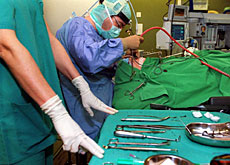Geneva washes hands of hospital bugs

A worldwide initiative to drastically reduce the more than 1.4 million hospital infections every year has been launched in Geneva.
The first Global Patient Safety Challenge, which promotes regular hand washing by doctors and nurses, is based on a model developed at the city’s University Hospital.
According to the World Health Organization (WHO), which is behind the campaign, between five and ten per cent of patients admitted to hospitals in industrial countries pick up infections. This figure rises to more than 25 per cent in developing countries.
“It is unacceptable that any patient should be exposed to health risks from their care provider,” said Lee Jong-Wook, director-general of the Geneva-based WHO.
In Switzerland alone there are 70,000 health-care associated infections a year, leading to additional costs of SFr250 million ($192 million).
A recent study by Swiss-NOSO, a medical journal dedicated to hospital hygiene, revealed that 7.2 per cent of patients contracted an infection. This figure rose to one in four for intensive-care patients.
Swiss-Noso found that many infections occurred because hospital staff failed to wash their hands properly.
The Federal Health Office is to launch a “Swiss Hand Hygiene” campaign in January next year.
Infection control
The new WHO guidelines on hand hygiene are based on the so-called “Geneva Model”, developed by Didier Pittet, head of the infection control programme at Geneva University Hospital.
It recommends that hospital staff use an alcohol-based hand rub, which has proved to be more effective than soap and water.
Introduction of the hand hygiene strategy saw the level of infections at the hospital fall by half.
The model has since been exported to hospitals in Europe, the United States, Canada, China, Japan and Australia.
“If the model is applied worldwide we would hope to see a 30 per cent reduction in infections,” Pittet, who is heading the WHO campaign, told swissinfo.
According to the WHO, better hand hygiene would also help to control a possible flu pandemic. The agency has been warning for two years that a pandemic is imminent and could cause up to 7.4 million deaths worldwide.
“If people with influenza in a pandemic situation were admitted to a hospital, these [hand hygiene] guidelines could help to reduce the amount of cross-infection from one patient to another or to the staff,” said Liam Donaldson, chairman of the WHO’s World Alliance for Patient Safety.
swissinfo, Adam Beaumont in Geneva
The Geneva Model comprises five elements:
Development of a new method of hand hygiene.
Education of staff through regular awareness campaigns.
Regular monitoring of compliance.
Active participation of healthcare workers in promotional campaigns.
Strong and visible institutional support.
The Global Patient Safety Challenge is a core programme of the WHO’s World Alliance for Patient Safety, launched in 2004.
It brings together new guidelines on hand hygiene in health care with strategies already addressing risks for infection in areas such as blood, injection and immunisation, clinical practices, safe water, sanitation and waste management.

In compliance with the JTI standards
More: SWI swissinfo.ch certified by the Journalism Trust Initiative









You can find an overview of ongoing debates with our journalists here . Please join us!
If you want to start a conversation about a topic raised in this article or want to report factual errors, email us at english@swissinfo.ch.